It’s not rare for someone to start a new medication and suddenly feel like they’re losing touch with reality. Maybe they hear voices when no one’s there. Or they become convinced their neighbor is spying on them through the walls. These aren’t just bad dreams or stress reactions-they’re signs of medication-induced psychosis. This isn’t schizophrenia. It’s not a lifelong mental illness. It’s a reaction. And it can happen fast-sometimes within hours of taking a pill.
What Exactly Is Medication-Induced Psychosis?
Medication-induced psychosis means your brain is reacting to a drug in a way that causes you to lose touch with reality. You might see, hear, or believe things that aren’t real. The DSM-5, the official guide doctors use to diagnose mental health conditions, says this must happen during or within a month after taking a drug-or coming off it. It’s not about being high on street drugs (though those can cause it too). It’s about prescription meds, over-the-counter pills, even supplements you didn’t think could do this.
Think of it like a software glitch. Your brain’s normal programming gets interrupted by something foreign. The symptoms look like schizophrenia, but they’re temporary. And that’s the key difference: if you stop the drug, the psychosis usually goes away. But if you don’t recognize it for what it is, you could end up on long-term antipsychotics you don’t need.
Common Symptoms to Watch For
The signs aren’t always dramatic. Sometimes they start quietly. A person might become unusually suspicious, withdrawn, or anxious before full psychosis hits. Here’s what to look for:
- Delusions: Strong false beliefs, like thinking you’re being followed, poisoned, or controlled by an outside force
- Hallucinations: Hearing voices, seeing shadows move when no one’s there, feeling bugs crawling on your skin
- Disorganized speech: Jumping between unrelated topics, speaking incoherently, using made-up words
- Confusion or memory gaps: Forgetting recent conversations, losing track of time
- Unusual behavior: Acting aggressively, dressing oddly, wandering without purpose
Research shows that persecutory delusions-the feeling someone wants to hurt you-and auditory hallucinations are the most common. In fact, nearly 90% of people addicted to cocaine report paranoid thoughts, and over 95% report hearing things others don’t. But you don’t need to be using street drugs for this to happen.
Which Medications Can Cause This?
Most people assume only illegal drugs or psychiatric meds cause psychosis. That’s not true. Many everyday prescriptions carry this risk:
- Corticosteroids (like prednisone): Used for inflammation, asthma, or autoimmune diseases. About 5.7% of people on high doses develop psychosis.
- Antimalarials (like mefloquine): Taken for travel to malaria zones. The European Medicines Agency has logged over 1,200 psychosis cases since the 1980s.
- Antiretrovirals (like efavirenz): Used for HIV. Around 2.3% of users report severe psychiatric side effects.
- Antidepressants (SSRIs, SNRIs): Rare, but possible-especially in younger people or those with no prior mental health history.
- Antiepileptics (like vigabatrin): Used for seizures. Psychosis occurs in about 1.1% of users.
- First-gen antihistamines (like diphenhydramine): Found in sleep aids and cold meds. Can cause confusion and hallucinations, especially in older adults.
- Stimulants (methylphenidate, amphetamines): Used for ADHD. Can trigger paranoia and hallucinations at high doses.
- Levodopa and other Parkinson’s meds: Can cause vivid dreams, hallucinations, and delusions.
Even ibuprofen in very high doses or opioid painkillers have been linked to psychotic episodes. The risk isn’t about the drug being "bad"-it’s about how your body reacts to it. Genetics, age, and existing brain chemistry all play a role.
Who’s Most at Risk?
Not everyone who takes these drugs will get psychosis. But some people are far more vulnerable:
- People with a personal or family history of schizophrenia or bipolar disorder
- Women (studies show higher rates in females across multiple drug classes)
- Older adults (slower metabolism, more meds, brain changes with age)
- People with substance use disorders (62% of first-episode psychosis patients had an active drug problem at the time)
- Those taking multiple medications at once (drug interactions increase risk)
One study found that 74% of people hospitalized for their first psychotic episode had a history of substance abuse. That doesn’t mean drugs caused their psychosis-it means their brain was already on edge. A new medication might be the final trigger.
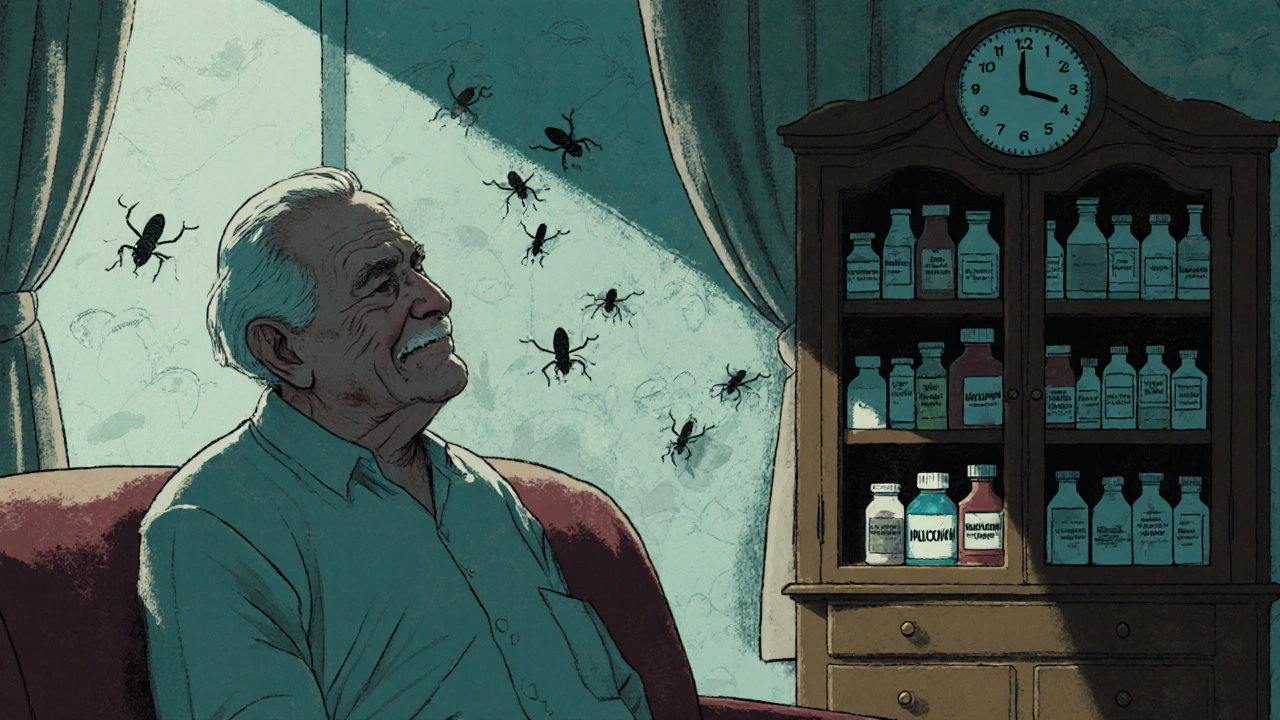
Emergency Management: What to Do Right Now
If someone is having a psychotic episode from a medication, time matters. Don’t wait. Don’t assume they’re just "stressed." Call a doctor or go to the ER immediately.
The first and most important step: stop the suspected medication. But don’t just quit cold turkey-especially with steroids, antiseizure drugs, or alcohol. Sudden withdrawal can make things worse. Always consult a professional.
In the emergency room, doctors will:
- Check vital signs and rule out infections, low blood sugar, or brain injuries
- Order blood tests to check for drug levels, electrolyte imbalances, liver/kidney function
- Look for signs of withdrawal (like tremors, sweating, seizures) if the person stopped alcohol or benzodiazepines
If the person is agitated or dangerous to themselves or others, they may be given a short-acting antipsychotic like olanzapine or quetiapine. These aren’t a cure-they’re a buffer. They calm the brain enough to let the body clear the bad drug. But they’re not always needed. In many cases, just stopping the trigger and providing quiet, safe support is enough.
For alcohol or benzo withdrawal psychosis, doctors use benzodiazepines to prevent delirium tremens-a life-threatening condition. For stimulant-induced psychosis, they focus on hydration, cooling the body, and monitoring for muscle breakdown (rhabdomyolysis).
How Long Does It Last?
Recovery time depends on the drug:
- Cocaine or amphetamine: Symptoms often fade in 24 to 72 hours after last use
- Steroids: Usually clear up in 4 to 6 weeks after stopping
- Antidepressants or antihistamines: May take 1 to 4 weeks
- Alcohol: Can take weeks, especially if there’s brain damage from long-term use
Most people recover fully. But here’s the catch: if symptoms last longer than a month after stopping the drug, doctors will start looking for an underlying condition like schizophrenia. That’s why follow-up care is critical-even if you feel fine.
Why This Is Often Missed
Doctors miss medication-induced psychosis all the time. A 2019 study found only 38% of primary care physicians felt confident diagnosing it. Why?
- Patients don’t mention new meds unless asked
- Doctors assume psychosis = schizophrenia
- It’s easier to prescribe an antipsychotic than to dig into medication history
- Many people don’t realize OTC drugs can cause this
That’s why you need to speak up. If you or someone you know starts acting strangely after starting a new pill, say it out loud: "Could this be from the medication?" That simple question can prevent years of misdiagnosis.
Prevention and What You Can Do
You can reduce your risk:
- Always tell your doctor about every medication, supplement, or recreational drug you take-even if you think it’s "not important"
- Ask: "What are the psychiatric side effects of this?" before starting any new drug
- Monitor your mood and thoughts for the first few weeks after starting a new medication
- If you’re on high-risk drugs like steroids or antimalarials, get a mental health check before starting
- Keep a list of all your meds and share it with every provider
The FDA now requires warning labels on drugs like efavirenz and mefloquine. These labels tell patients: "Call your doctor immediately if you feel depressed, anxious, or hear voices." Pay attention to those warnings. They’re there because people have died from being ignored.
What Happens After the Crisis?
Once the acute phase passes, you need follow-up. Not just for your physical health-but your brain’s recovery. A psychiatrist should evaluate you 3 months after symptoms disappear. Why? Because sometimes, the medication didn’t cause psychosis-it revealed a hidden one.
Studies show that 7-10% of first-time psychosis cases in ERs are actually medication-induced. That means 90-93% are something else. But if you don’t rule out the drug, you might get mislabeled as having schizophrenia and put on lifelong meds you don’t need.
There’s also new research into genetic markers that might predict who’s vulnerable. In the future, a simple blood test could tell you if you’re at higher risk for reactions to certain drugs. Until then, awareness is your best tool.
Medication-induced psychosis isn’t a life sentence. It’s a warning sign. A glitch. A signal that your body didn’t handle something the way it should. With quick action, most people walk away without lasting damage. But if you wait, if you ignore it, if you assume it’s "just stress"-you could end up in a system that treats you like you have a chronic illness… when you just need a different pill.
Can over-the-counter meds cause psychosis?
Yes. First-generation antihistamines like diphenhydramine (found in Benadryl, Tylenol PM, and many sleep aids) can cause hallucinations and confusion, especially in older adults or when taken in high doses. Even large amounts of pseudoephedrine (in cold meds) have been linked to paranoia and anxiety that can escalate into psychosis.
Is medication-induced psychosis the same as schizophrenia?
No. Schizophrenia is a chronic brain disorder with symptoms that last more than six months and aren’t tied to a drug. Medication-induced psychosis starts after taking a substance and usually ends within a month after stopping it. The symptoms can look identical, but the cause and prognosis are completely different. Misdiagnosing one for the other can lead to unnecessary lifelong treatment.
Can you get psychosis from quitting a medication?
Absolutely. Withdrawal from alcohol, benzodiazepines, opioids, and even some antidepressants can trigger hallucinations and delusions. This is especially dangerous with alcohol or benzos-sudden quitting can lead to delirium tremens, which is life-threatening. Always taper off under medical supervision.
Are antipsychotics always needed for treatment?
Not always. Many cases resolve with just stopping the drug and supportive care-rest, hydration, a calm environment. Antipsychotics are used only if symptoms are severe, the person is unsafe, or they don’t improve after 24-48 hours. They’re not a cure-they’re a temporary tool to manage symptoms while the body clears the trigger.
How long should I wait before seeing a doctor if I think I’m having psychosis?
Don’t wait. If you’re hearing voices, believing things that aren’t true, or acting in ways that scare you or others, call your doctor or go to the ER immediately. Early intervention improves outcomes dramatically. Waiting even a few days can increase the risk of self-harm, hospitalization, or permanent brain changes from prolonged stress.
Can cannabis cause medication-induced psychosis?
Yes. Up to 10% of cannabis users experience psychotic symptoms like paranoia or hallucinations, especially with high-THC strains. For people with a genetic vulnerability, even one use can trigger a lasting episode. If psychosis happens after using cannabis and doesn’t fade within a week, it may signal an underlying psychotic disorder.
Final Thought: Speak Up, Act Fast
Medication-induced psychosis is silent. It doesn’t come with a warning label everyone reads. It hides behind "I’m just stressed" or "I’ve been sleeping poorly." But it’s real. And it’s treatable-if you catch it early. If you’re on a new drug and your mind feels off, don’t brush it off. Don’t wait for it to get worse. Talk to someone. Get help. Your brain deserves that much.

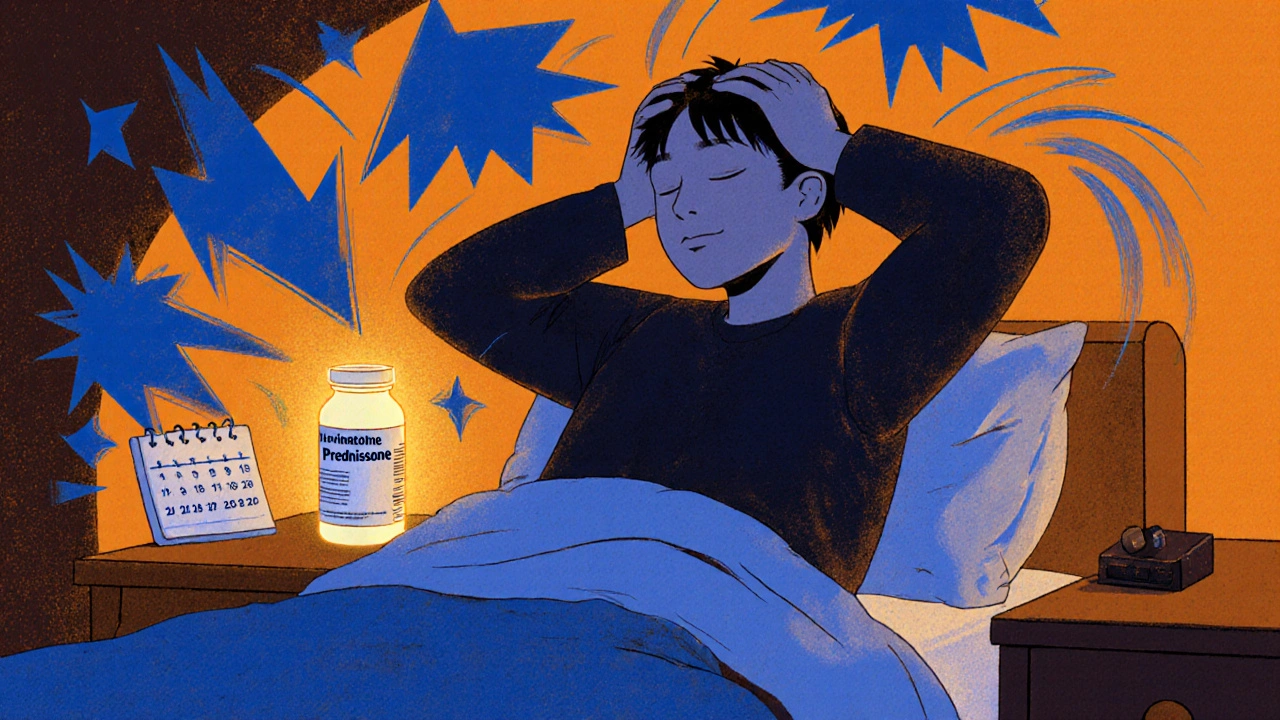

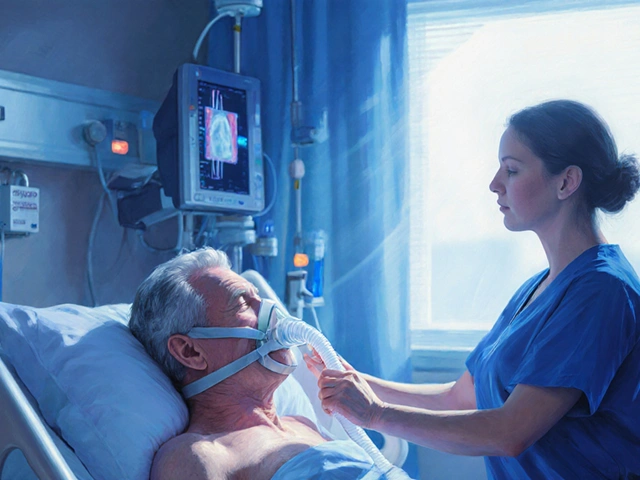
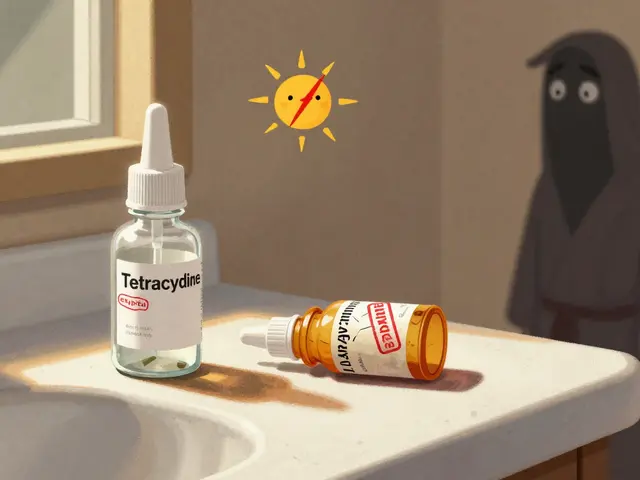
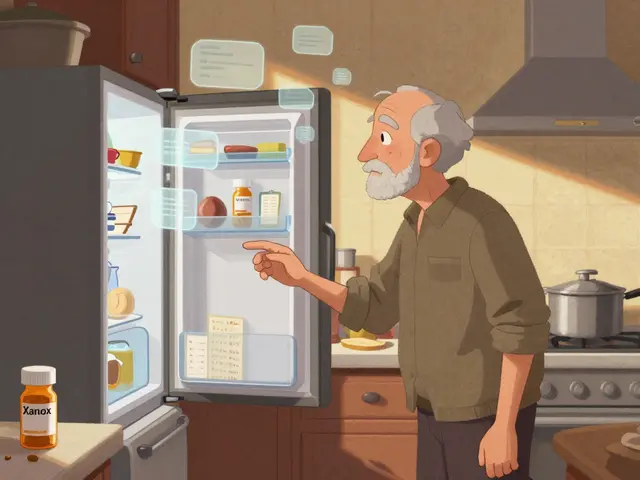
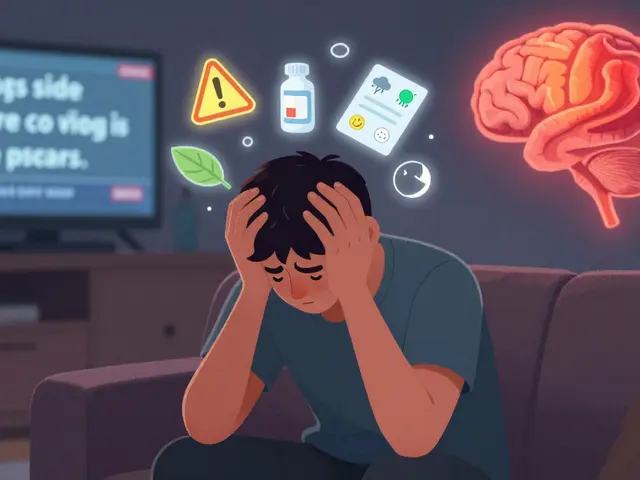
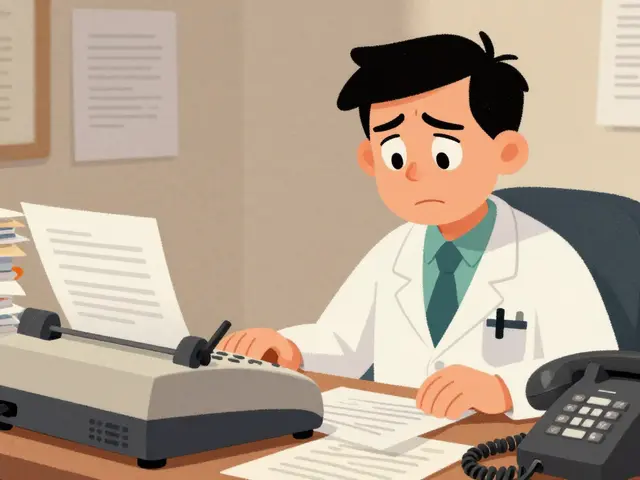

Holly Powell
17 Nov 2025 at 15:37Let’s be clear: this is a textbook case of pharmacovigilance failure. The DSM-5 criteria are woefully underutilized in primary care, and the iatrogenic burden of CNS-active agents is systematically underreported. The neurochemical cascade triggered by corticosteroid-induced dopaminergic dysregulation is not anecdotal-it’s meta-analytically validated. We’re witnessing a latent iatrogenic epidemic masked as "stress" or "anxiety." And yes, diphenhydramine? That’s a muscarinic antagonist with anticholinergic psychosis potential-especially in elderly polypharmacy cohorts. We need mandatory pharmacogenomic screening before prescribing anything with CNS penetration.